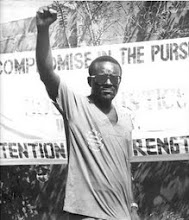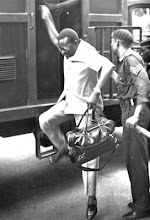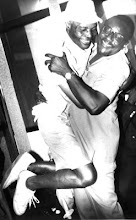 |
| Pastor Tunde Bakare & Justice Ayo Salami at the event |
Organised by the Ikeja branch of the
Nigerian Bar Association (NBA), the event was put together to honour the late
legal luminary, Chief Gani Fawehinmi (SAN). In his speech, while eulogising the
virtue of Fawehinmi, Bakare said Gani, while alive, fought for the masses and
was never afraid to fight for justice and truth. According to him, Gani proved
he was indeed ‘Senior Advocate of the Masses’, a sobriquet he earned because of
his fights for human rights. “He (Gani) was the dread of dictators, a thorn in
the flesh of oppressors, a defender of the poor, the people’s lawyer. He is
remembered today not for the houses he built though he built a few edifices,
not for the cars he rode, though he was wealthy enough to afford them, not for
his professional attainment though he won quite a few awards including the
Bruno Kerensky Price for internationally recognised human rights advocates, the
International Bar Association’s Bennard Simon’s Award and eventually, the
highest honour in the Nigerian legal profession, Senior Advocate of Nigeria
(SAN), after having been politically denied his due for many years. Gani is
remembered today for the lives he uniquely touched,” he eulogised.
Organised by the Ikeja branch of the
Nigerian Bar Association (NBA), the event was put together to honour the late
legal luminary, Chief Gani Fawehinmi (SAN). In his speech, while eulogising the
virtue of Fawehinmi, Bakare said Gani, while alive, fought for the masses and
was never afraid to fight for justice and truth. According to him, Gani proved
he was indeed ‘Senior Advocate of the Masses’, a sobriquet he earned because of
his fights for human rights. “He (Gani) was the dread of dictators, a thorn in
the flesh of oppressors, a defender of the poor, the people’s lawyer. He is remembered
today not for the houses he built though he built a few edifices, not for the
cars he rode, though he was wealthy enough to afford them, not for his
professional attainment though he won quite a few awards including the Bruno
Kerensky Price for internationally recognised human rights advocates, the
International Bar Association’s Bennard Simon’s Award and eventually, the
highest honour in the Nigerian legal profession, Senior Advocate of Nigeria
(SAN), after having been politically denied his due for many years. Gani is
remembered today for the lives he uniquely touched,” he eulogised.
Bakare added that Gani’s passion for the
masses made him to handle so many cases free of charge and was never overly
concerned with material gains. “Gani fought like a bulldog and once he was
persuaded that a case was worth handling, he would deploy the power of
concentration and pursued it to a logical conclusion and he never abandoned his
cases. Gani’s passion for justice was legendary and it overrode his need for
profit, yet God blessed him with a business acumen that sustained his
humanitarian life and purpose. He would not refuse cases simply on the basis of
the inability of the prospective client to afford legal representation, rather
once he was convinced that justice for the poor was at stake, he would handle
such cases pro bono. The rule of law, fundamental human rights, democracy and
social justice summed up the profit for which he laboured with boundless
energy.” He added, “As a human right activist, Gani was in class of his own,
ready to go solo for what he believed in, many times to the consternation of
his colleagues in the struggle. He was in the struggle to spend and be spent.
“As it were, he died for the people of this country when the cumulative effects
of years of brutal treatment in jail cells finally told on him as he succumbed
to lung cancer. Yet, heroically, even on his death bed, he remained a fighter,
not just in instructing his chambers to pursue to logical conclusion his
pending cases against the Federal Government, but also took the failure of our
country’s medical system to diagnose his ailment early enough as evidence of
the country’s social decay, as such expressed a desire that such facilities be
made available for the Nigerian people. Therefore, in his life and death,
Gani’s mission was the liberation of the people from social, economic and
political bandage.”
Tracing the genesis of the Nigeria’s
problem, the General Overseer of Latter Rain Assembly and convener of Safe
Nigeria Group (SNG) said Nigeria began to experience problems the moment true
federalism was jettisoned by past governments shortly after Nigeria gained
independence. He added that selfishness on the part of politicians to acquire
wealth plunged Nigeria to corruption. He further said that tribal sentiments fanned
by politicians resulted into religious crisis which has thrown Nigeria into its
present condition. “The framework of the democratic Nigerian state at
independence was hinged on true federalism in acknowledgement of the fact that
ours is a nation comprised of many national sub-entities. The new Nigerian
state was structured along regional federating units that allowed each region
to pursue its ideals and developmental aspirations at its own pace within
Nigerian national ideal. Each region had its own constitution, each region had
its own coat of arms, and each region possessed residual constitutional powers
such that matters that were not within the national jurisdiction fell within
regional legislative powers. “However, within a short while, abundance translated
to selfishness as politicians became consumed with occupying the neo-colonial
space in class distinction, but to sustain the class differences they resorted
to corrupt and ostentatious living while living conditions became increasingly
difficult for the people. Politicians fanned the embers of ethnic and regional
divisions to consolidate their power bases and by so doing, gave up the pursuit
of a Nigerian ideal thereby halting the evolution of a true Nigerian nation.
Development was no longer the motivation for public service. Election rigging
and politically motivated violence held sway in the west as the brightest were
crowded out of the system. By these actions, the politicians had shown they are
unable to govern and had demonstrated dependence on the military. With
officials engrossed in corrupt enrichment, government’s focus shifted from
developmental or transitional programmes and complacency set in. The Nigerian
people would then become apathetic resigning themselves to the situation
waiting for the next messiah, thereby demonstrating their inabilities to take
their destinies, a despicable state of dependence.” Proffering solutions, Bakare
said the proposed national conference is a good opportunity for Nigerians to
come together and deliberate on our co-existence. He said emphasis should be
placed on restructuring the country before the 2015 election. “We must return
to the dialogue table to restructure. We must get set to rebuild and restore,
we must retrieve what is remaining of the pillars of our founding fathers and
we must restructure and reconstruct; we must rebuild from wall to wall, from
gate to gate, from community to community, from city to city and from region to
region until the whole nation is restored to its former and even greater glory.
That is why we welcome the idea of a constitutional conference and insist that
the modalities must be genuinely people driven. Those against it are selfish
and self focused.” Continuing, he said: “Therefore, we must find a creative
mechanism to bring all the sub-nationalities together to negotiate the destiny
of our nation in such a manner that smoothly and peacefully transports us from
the current system to a true people’s constitution that has genuine claims to
the phrase ‘We the People’. Such a constitution must guarantee social and
economic rights as well as civil and political rights without derogating these
rights through backdoor provisions. We must embark on people-driven
restructuring, cautiously impossible males violent change inevitable and that a
constitution that will not bend will break.” On 2015, he said: “Therefore, we
must not put the cart before the horse by placing emphasis on 2015. If we do
not do the needful in 2014, there may be no 2015, but if we dedicate ourselves
to restructuring our nation at this opportune time, the outcome will be the
emergence of credible leadership that will ensure a Nigeria that works.”










No comments:
Post a Comment